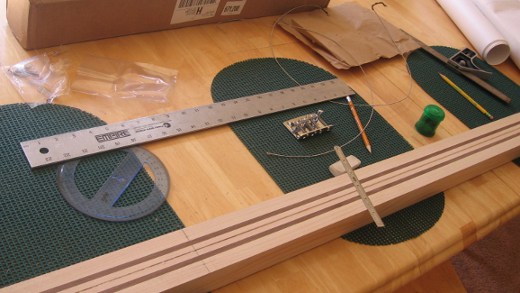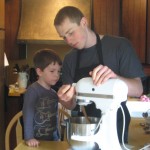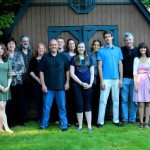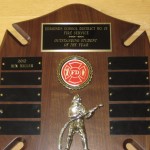
- Real math looks different than workbooks and school math, and real learning happens in a variety of ways every day.
A while back, someone wrote to me asking about math and workbooks, and recently a couple others have asked some similar questions, so I thought I’d bring the topic here to share some of my thoughts about it. Here’s the initial inquiry and my responses:
“My concern is that I can’t let go of worrying about their math abilities. I keep feeling like I need to purchase a workbook for them, but it seems that this is not in keeping with unschooling. We have Cuisenaire rods that we play with from time to time, and we bake a lot, but that’s it. I worry about how my kids will acquire the math knowledge they need as they get older, if this is all we do. Do you have any thoughts?”
I think we’re conditioned to think of school math as the only best way to learn math. It’s what we’re familiar with, and it seems simple to just do the same thing as everyone else. But worrying and workbooks won’t likely help our kids. It might hinder them. And it will hinder our growth toward unschooling.
One of the ways it might hinder things is that it might cause you (and your kids) to think about mathematics in a smaller, narrower way. For instance, if you have a workbook, and you get the kids to use it, then you might think, “Oh good, now we’ve covered math.” But then you’ll miss noticing and appreciating all the other math in your lives.
Practically speaking, the same could happen with Cuisenaire rods and baking, but it seems less likely. As an unschooler, if you see those things as just some of the many fun activities in your lives, then you can think of them as not more important than playing with dolls or building with Lego, or playing a game of Monopoly. They’re all valuable.
Luz Shosie wrote this great post for thinking about unschooling math, and I think it’s good to reread often.
Another reason workbooks might hinder learning is that they’re often quite abstract. If you’re just focusing on pencil/paper numbers, it’s harder to think about and see what those numbers really mean in real life. If kids are playing with pattern blocks, or a game of Monopoly, or counting doll items, the items are right there in front of them to help with any understanding and problem solving they may be thinking about.
Sometimes pencil/paper math slows down the mathematical thinking. The focus is on the abstract numbers instead of the meaning. I think anything that’s written related to math should be for the benefit of the user, not just as something to do for its own sake. For instance, if you’re playing a game, and scoring points of some kind, you might do the scoring in your head or you might write it down. You might even use color tiles as counters to keep track of the score. What makes sense in the given situation? If it helps to write it down, great! If it’s easier to keep track in your head, then do that. The same is true for any mathematical work a builder or bookkeeper might do, too. (I’m a bookkeeper, and sometimes I do things in my head, sometimes I write things down, and sometimes I use an adding machine.)
In the past, if my son wanted to know how to write out some numbers or equations, I’d show him, or if I thought he’d like to see a common way to write out an equation, I’d write down something that he verbalized. Mostly, I would do this type of writing myself because then he could keep doing the playing and thinking and mental mathematics without interruption. By then, the mathematical thinking had already occurred, mentally and verbally. I was just writing down the numerical ideas he was expressing.
For a short period of time when Ben was younger, we did enjoy some parts of a few Miquon math workbooks. It was fun for a while, but then when he wasn’t interested, we shelved them. Looking back at that time, I believe most of the real learning occurred without them at all. It occurred from the games, activities, conversations, and real math all around us.
Your kids might like workbooks, and if they are the ones asking you for them, that might be slightly different, but you might also ask yourself WHY they’re asking for them. If they see other kids using workbooks, they might be interested in them as just something fun to do. Or they might think that you think that’s the only way to learn math. Unschooling kids might choose to explore and play with workbooks, but often that’s not how it happens. Usually it comes from a worrying parent.
Pam Sorooshian and Joyce Fetteroll have some great posts about math learning, and workbooks and programs.
To me, mathematical thinking has to do with fun and exploration and solving everyday problems. Real math looks different than workbooks and school math, and real learning happens in a variety of ways every day. If you take time to see all the natural, everyday mathematics around you, you’ll be less likely to feel compelled to use workbooks, or to focus on abstract, schoolish math. Over the years, I have come to believe that people will acquire the math knowledge they need as they need it.






I just read the book “Born on a Blue Day,” which is a memoir written by a man with Asperger’s and synesthesia. Numbers have shapes and colors and even emotions attached to them. They’re even different sizes in his mind’s eye.
I was thinking about that today when Orlando asked me how long it had been since I played the Monster game with him at the park and he said it must have been six weeks and then he asked “Is six weeks a month?” and I said “No, there are four weeks in a month, on average.” And I added that “Since we were gone in Hawaii for two weeks (or a half a month), I think it is more like three weeks since we played it.” And he asked, “How many days is that…” and answered his own question, “Hm…. seven days times three is twenty?” I looked at him and then he quickly said, “21.”
I have no idea HOW does multiplication but he often answers one or two off and then corrects himself. Reading that book just made me realize that I don’t really want to meddle or try to control the methods by which my children come to their answers and that he is having his own relationship to those numbers. It’s not as dramatic of a relationship as the author of that book perhaps, but it is his own.
The other day, we were playing a board game called Sum Swamp and one part of the game is that you can land on squares that say odds or evens, and then you roll the die. If you get a number that is of that sort, you move forward that many squares. Orlando landed on odds and I recapped that he’s supposed to roll the die and just as I was realizing that I was introducing the idea of odd/even numbers to him, mentioning something about being divisible by two, he rolled the dice, got a 3 and said, “Yeah!” and moved his guy forward. So I guess I don’t have to worry about how to explain that concept to him! 🙂
Also, today, Orlando thought up a new game: drawing his own mazes. He brought me half a dozen mazes today on paper, challenging me to get to the middle, and asked me to make him some, too.
I am so glad I know you, Marcia!
Best,
Stacy
Thanks so much for sharing all these details, Stacy. It’s so cool you’re really listening to what Orlando is thinking and letting him figure his own methods for considering mathematical ideas.
My guess is, when he’s multiplying, he’s combining various numbers that he’s familiar with (like 7 and 7), and then adding a bit more and adjusting when he gets closer to a total (i.e. Hmm…would 7 more be 20 or 21?). The fact that he’s changing his mind sometimes is great because he’s really thinking about if an answer makes sense or is reasonable or not. I love it!